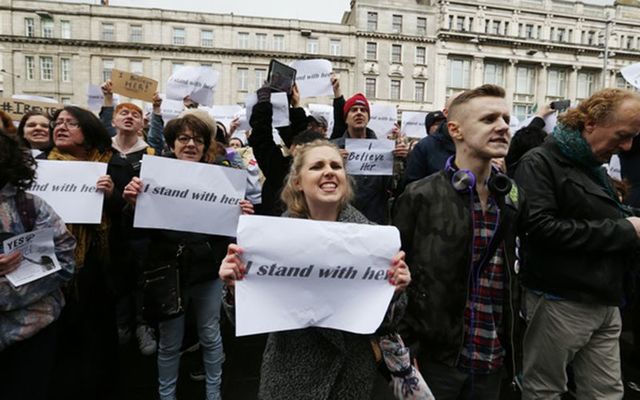Young people are entering the stage of struggle. This new wave of activists hold ideas of equality and liberation from oppression as central to their world-view. These young people have a passionate opposition to racism, sexism, homophobia and transphobia. In fact any denial of rights and dignity is being roundly rejected argues Monika Janas.
A deep understanding of the need for solidarity is part of young people’s mentality and it permeates into the new global feminist wave that has emerged in the last number of years. When anti-choice groups tried to target the LGBTQ community by campaigning outside of the George, a popular gay bar in Dublin, they were met with resistance from the employees of the bar, activists and passers-by.
This new section of young people are becoming an active element in global politics and recognise that isolated struggles are doomed to fail. They see that there is a necessity for a successful fightback to place their needs to be a recognition of the rights of all those who suffer under capitalism and a struggle against all forms of oppression.
Sexist ideas – anti-capitalist fightback
A vital part of this new wave of action is how far-reaching it is; we are witnessing a rise of a global fightback against all forms misogyny and sexism.
Issues of sexual assault, harassment, inequality in the workplace, such as the pay gap, have become part of the everyday discourse, highlighted by prominent figures in Hollywood speaking out about the injustices that they have suffered, but pushed by a momentum from below of ordinary, working class women refusing to be silent. The impact of #MeToo is undeniable, as it is international. In the U.S., Facebook said 45% of users have had friends who posted the hashtag, illustrating the hardships women and gender non-conforming people experience under capitalism.
The truth is that all of this section of society has experienced some level of sexual harassment or discrimination.
The rising popularity of anti-capitalist ideas is supported by many young people drawing the conclusion that at the core of the inequalities that they witness and experience is the drive for profit by a small elite. They see that unless we struggle against the 1% that is exploiting women, young people and all workers, our fightback is limited.
International movement
The desire for gender equality has found its expression in mass protests throughout the world.
In Ireland, this has presented itself in the huge #IBelieveHer demonstrations following the verdict from the rape trial in Belfast. At the protests, there was a tangible feeling of rage against the sexist, misogynistic judicial system, the lack of proper sex education in schools and a clear connection was drawn between this issue and the struggle for bodily autonomy captured within the repeal movement.
In Latin America, last year there were eruptions of resistance against the macho culture prevailing there, the rate of sexual assault and harassment, and wide-spread femicide. The Ni Una Menos (“not one less”) movement which started in Argentina and spread through the region, fought back against a society that allows for a woman to be killed every two hours. An estimated 86% of women surveyed had been subjected to harassment or violence in public, and disgustingly, 84% reported having been sexually harassed by the police.
The protests in America following Trump’s election were some of the biggest mass mobilisations the United States have ever seen. The idea of having a man in the White House who brags about committing sexual assault rightfully jars with women and young people in the US, who are looking for a different world to be built.
These protests have become a reference point for how to struggle and were undoubtedly the reason as to why we saw the massive school walk-outs around gun control now and not before. The confidence in protests and direct action was injected into those willing to fight.
On International Women’s Day, a historic feminist strike took place in Spain with 5.3 million taking part in it. It was phenomenal and unprecedented. This approach of working class and young women integrating the feminist struggle into the working class struggle is powerful.
Enough is enough
Opposition to misogyny is now an undeniable part of the worldwide struggle for equality, and not something will dissipate. One only has to open a newspaper to see evidence of how significant these developments are and how they will ripple through our society, undermining the status quo, threatening the establishment everywhere and bringing about change.
For as long as women are oppressed, a resistance will take place, a battle for equal rights and an ultimate overthrow of our sexist society has to be fought for. No equality can be achieved without women’s liberation and the latter cannot be achieved under the rule of billionaires which capitalism is built upon. We need a global socialist movement that will defeat this system once and for all.












